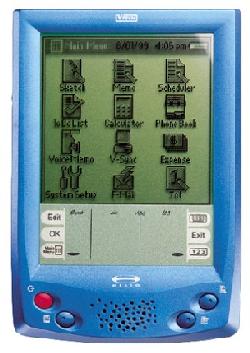Device Profile: VTech Helio PDA (from the Linux perspective)
Nov 30, 2000 — by Rick Lehrbaum — from the LinuxDevices Archive — 43 viewsForeword: The VTech Helio is no longer sold by VTech, but devices are said to be available second-hand for around USD $100.
VTech's Helio is a low-cost PDA that uses VT-OS, a proprietary operating system, as its software platform. So for the moment, it's not a Linux-based device. But read on, because that's likely to change — and has already, to some extent!
For the fashion conscious, the Helio comes in a choice of five colors: metallic blue, translucent blue, pink, lime, and (well, it's not really a “color”) clear. It's based on a 75 MHz 32-bit RISC processor, with 8 MB of SDRAM for program operation plus 2 MB Flash for nonvolatile program and data storage. It sports a 160 x 160 pixel, 16-level grayscale, backlit LCD display, and has a 1024 x 1024 cell touchpad. The device ships standard with integrated audio for voice record/playback and alarm notification, one standard RS232 port, and one high-speed serial data communication port. The unit can be powered for up to 30 days of “normal” use or 20 hours of continuous operation, from its internal pair of AAA alkaline batteries.

Because VT-OS is a one-PDA OS, users of the device are limited to the suite of supplied applications. Fortunately, they cover the bulk of what users expect from a PDA: phone book, todo list, calendar, memos, email, sketch, expenses, calculator, voice recorder, and handwriting recognition. In addition, the Helio comes with a program that lets you synchronize with GoldMine, Lotus Organizer, Microsoft Outlook, and ACT! data.
Not surprisingly, in light of intense competition from the growing number of PDAs that run PalmOS, Windows CE (Pocket PC), or Embedded Linux, there has been some interest in getting an alternative, more “open” OS, running on the Helio. In the case of Embedded Linux, there is a community project to support it on the Helio (see below).
Technical specifics
Here's a summary of the Helio's hardware features, functions, and specs . . .
- CPU: Toshiba TMPR3912AU, 75 MHz., 32-bit RISC CPU
- Memory: 8MB SDRAM; 2MB Flash
- Input mechanisms: Stylus input via touch screen display, Communication Intelligence Corp.'s Jot character recognition, and soft keyboard.
- Communication ports: 1 standard RS232 serial port, one high-speed serial port.
- Audio: built-in microphone and speaker; record/playback (up to 25 minutes) and alarm notification
- Display: 160 x 160 pixel (59 x 59 mm), 16-level gray-scale, backlit LCD display. 1024 x 1024 resistive analog touchpad.
- External Buttons: 3 shortcut buttons for instant access to applications, 3 voice recording/playback buttons, 2 scroll buttons
- Power Requirements: 3 VDC; typ. average drain is 54 mW, typ. stand-by power drain is 1.8 mW; 2 AAA alkaline batteries provide power for 30 days of “normal” use, or 20 hours of continuous operation (with power management software).
- Size: 4.6 x 3.1 x 0.6 in.
- Weight: 5.5 oz (includes batteries)
- Docking cradle: one-touch communication with PC software
As mentioned above, there are at least two ongoing efforts to provide a full set of Embedded Linux operating system and applications for the Helio, which are briefly described here . . .
- vhl-tools — vhl-tools is a SourceForge project to develop Linux support for the Helio, including utilities, patches, documentation, and integration of other Open Source software. They also host a developer discussion forum. To date, they have released demo versions of both a Helio version and an emulator version of the OS.
- Installing Linux on a VTech Helio PDA — in this tutorial, Jay Staton explains how to install Linux on the VTech Helio using PicoLinux as the base distribution.
This article was originally published on LinuxDevices.com and has been donated to the open source community by QuinStreet Inc. Please visit LinuxToday.com for up-to-date news and articles about Linux and open source.